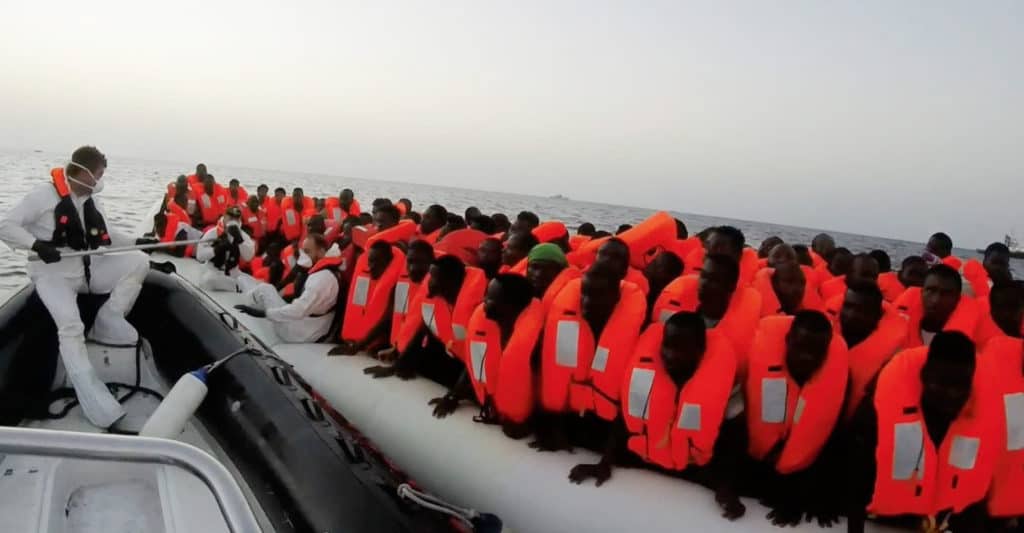More Than 8,000 Migrants Rescued in Mediterranean and Brought to Italy Over Easter Long Weekend
Nick Squire, Telegraph, April 18, 2017

Migrant boat rescued by Italian Coast Guard (Credit Image: © Ropi via ZUMA Press)
More than 8,000 migrants were rescued in the Mediterranean and brought to Italy in the space of just three days over Easter, as Italian politicians denounced the exodus as a racket that should be stopped as quickly as possible.
Nearly 8,500 asylum seekers were saved from dinghies and ex-fishing boats by the Italian coast guard, Frontex, the EU’s border patrol agency, and humanitarian NGOs operating rescue vessels.
It was a huge number, even by the standards of the relentless flow of migrants and refugees who regularly depart from the coast of Libya with the hope of reaching Europe.
The bodies of 13 migrants were recovered, including that of an eight-year-old boy who drowned. The spate of operations boosted the total number of rescues in the central Mediterranean so far this year to nearly 36,000.
The departure of so many boats was prompted in part by calm weather conditions, but also by concern among smugglers that EU efforts to beef up the Libyan coast guard may soon make it harder for them to operate.
“When 8,500 illegal immigrants arrive in three days, it’s clear that it is all organised,” said Matteo Salvini, the leader of the Right-wing Northern League political party.
Mr Salvini said he intended to sue the Italian government, as well as NGOs which rescue migrants at sea, for “favouring clandestine immigration”. The Northern League leader said: “It is quite clear that clandestine immigration is being organised. So we’ve decided to sue the government and the commanders of the navy and coast guard”.
If arrivals continue at this pace, 2017 could be a record year for migrants reaching Italy, outstripping even last year, when 181,000 were rescued and brought to Italian shores. Rescuing, processing and accommodating the asylum seekers is likely to cost the government 4.6 billion euros – a billion euros more than in 2016.
The government says it has little choice but to rescue the migrants, but critics say that trafficking gangs in Libya have come to depend on Italian, EU and NGO vessels deployed in the Mediterranean as a free taxi service.
Smugglers launch boats packed with migrants from Libyan beaches with little fuel and cheap outboard engines, knowing full well that they are likely to be rescued once they reach international waters.
“Thousands more people who don’t have the right to come to Italy, reaching our shores,” said Maurizio Gasparri, an MP from Silvio Berlusconi’s centre-Right Forza Italia party. “A catastrophe, the fault of the (governing) Democratic Party.”
Paolo Romani, another MP from Forza Italia, accused the Italian, British, French and German NGOs operating in the Mediterranean of “incentivising human trafficking” – a charge that organisations such as Medecins Sans Frontieres strongly deny, arguing that migrants will try to reach Italy regardless.
The majority come from West African countries such as Mali, Gambia, Ivory Coast, Nigeria and Guinea, as well as from other countries such as Bangladesh. They are classed as economic migrants, rather than refugees fleeing conflict.
At least 900 migrants have died while trying to reach Europe by sea so far this year. The International Organisation of Migration reported earlier this month that growing numbers of African migrants passing through Libya are traded in what they call “slave markets” before being held for ransom, forced labour or sexual exploitation.
“So there’s a full-on economy of trafficking or trading in migrants who think they are going to a better life in Europe and end up effectively in a gulag of exploitation,” IOM spokesman Leonard Doyle told a briefing in Geneva.















